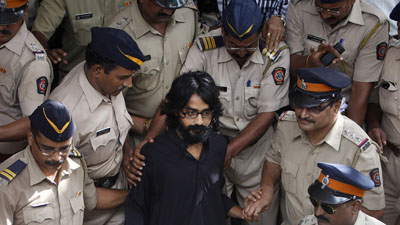Although it is the world’s largest democracy, India has retained its colonial-era sedition law. But with a national debate ensuing after the arrest of 25-year-old political cartoonist Aseem Trivedi on the antiquated sedition charge and others, members of the Indian government have been forced to do some soul-searching.
Government ministers formally initiated a review of the law, news accounts reported on September 14. The law, which was introduced by the British in 1870 to guard against rebellion, states that anyone who “brings or attempts to bring into hatred or contempt, or excites or attempts to excite disaffection towards the Government established by law in India” could face life in prison. The legislation falls under Section 124A of the Indian Penal Code.
“Many politicians have raised their voice against the sedition law, in public appearances and through Twitter. I hope they will do the same in parliament,” Trivedi told CPJ.
If convicted, Trivedi could face life imprisonment. The cartoonist, who was arrested on September 8 but is free on bail, told CPJ that he has four cases pending in different police stations with charges ranging from sedition to violation of the Information Technology Act, the National Emblem Act, and the Prevention of Insult to National Honour Act, among others. Trivedi had criticized corruption on his website, Cartoons Against Corruption, and published cartoons that mocked national symbols. One cartoon, for example, depicted India’s parliament house as a filthy toilet bowl. The website was shut down by the government when the cartoons surfaced last year.
Even while behind bars, Trivedi has spoken out against the injustice of the charges. In a statement from prison last week, he said, “If speaking the truth is sedition, then I have indeed committed sedition. If raising one’s voice against injustice is sedition, then I have committed sedition. If nationalism and the definition of nationalism have changed, then you could say I have committed sedition.”
The cartoonist also told CPJ that a special investigation team had been appointed to look into why he was charged with sedition. He said his next court appearance is scheduled for October 12 at the Mumbai High Court. After being released on bail last week, Trivedi told journalists, “This fight will continue until 124A is repealed.”
Decades ago, Mahatma Gandhi was charged under the sedition law during his struggle for independence. But critics in recent years have been silenced by the draconian law as well. In February 2010, journalists Vijay and Seema Azad were arrested on sedition charges after the police found “anti-national” literature in their possession. The couple, who had been accused of having links to Maoists, was finally granted bail after more than two years in prison.
Time and again, ideas have been conflated with sedition. In late 2010, the charge of sedition was leveled against notable writer Arundhati Roy for speaking out in support of Kashmiri independence. In 2008, magazine editor Lenin Kumar Roy was arrested after he blamed Hindu extremists for targeting minorities in the Kandhamal district.
Speaking of the Trivedi case, Indian journalist Salil Tripathy wrote: “These are only cartoons, not bombs.”
